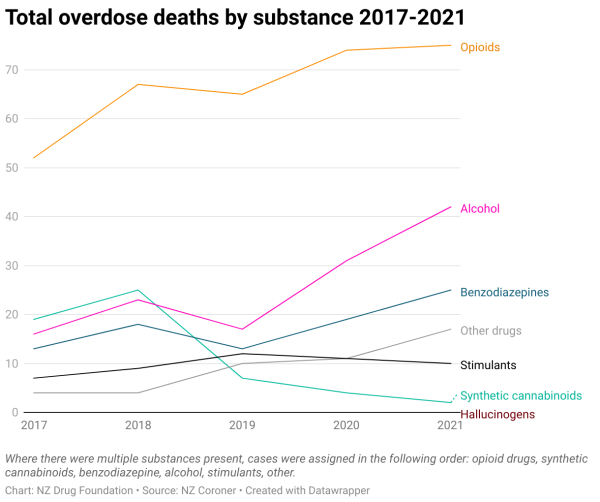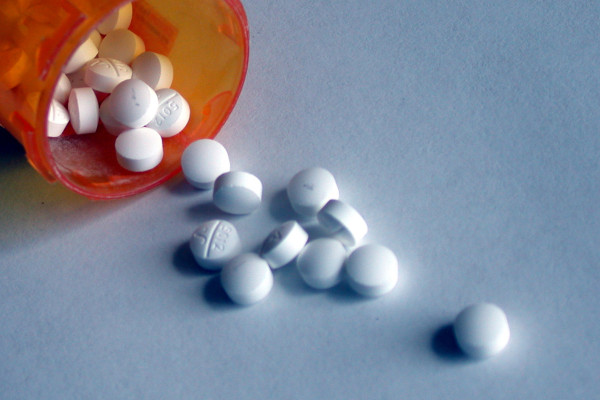It’s never fun to talk about, but drug overdoses do happen.
A new Drug Foundation report found that deaths from drug overdoses have risen 54% over the past five years. In 2021 alone, 171 people died.
While these numbers are appalling, there are things you can take to reduce your risk of overdose.
We’re digging into the facts from this report to find out what they can tell us about ways to stay safer.

The fact: Overdose deaths involving alcohol are on the rise
Alcohol is a legal drug. Over the past five years, it was involved in almost half of all overdose deaths. Alcohol is a nervous system depressant, which means it slows down your body and brain. In very high doses, it can slow things down so much that you lose consciousness or stop breathing.
What you can do:
Pace yourself when you’re drinking, and avoid mixing with other drugs. Drinking a glass of water between each alcoholic drink can help you pace yourself, and ward off dehydration. People react differently to alcohol, so trying to ‘keep up’ with someone else who is drinking might mean you get more drunk than you expect.
Mixing alcohol with other drugs can make the effects more unpleasant and unpredictable. Which leads us to the next fact...
The fact: Most people who died from overdose had taken more than one drug
91% of closed overdose death cases involved two or more substances. We know that mixing drugs – including alcohol – can cause issues.
What you can do:
Avoid mixing drugs. Do your research. If you are planning on mixing drugs or medicines together, the best thing you can do is understand how they work together, what the risks are and what to expect. If you’re taking prescription medication, you’ll need to factor that in too.
There are lots of great resources you can use to do this, such as the Tripsit combinations page and the drug interaction checker for prescription medicines.
We’ve got more info here about what to watch out for if you’re mixing drugs.

The fact: Mixing downers is the deadliest combination of drugs
Mixing depressants was the combination that caused the most overdose deaths in the past five years. Some common depressant drugs include: alcohol, opioids (like tramadol, codeine, poppy seed tea or home bake) and benzodiazepines (like Valium or Xanax).
What you can do:
Avoid mixing depressant drugs, such as alcohol and benzos. As we mentioned, depressant drugs slow down your body and brain – if you take too much, it could mean you can’t breathe or stay conscious. If you’re mixing depressants, this risk increases.
It’s best not to mix depressants, including alcohol.
Other tips for avoiding overdoses
- Check your drugs. Get your drugs checked at a free and legal drug checking clinic to find out what’s really in them. Different drugs have different dosages – if you know what you’re actually about to take then you have a better chance of getting the dosage right.
- Remember that dosages are different for everyone. Measure your dose using scales if you have access to them. Websites like Tripsit have some good basic guidance on dosage, but remember to...
- Start low and go slow. That means take a small dose to start with – especially if it’s a drug you haven’t taken before – and wait to see what the effects are before deciding to take more. Wait an hour or longer.
- Make an overdose plan. If you are around other people, try not to have everyone using at once. That means at least one person is able to respond in an emergency. If you’re using any drug alone, tell a trusted person what you’re doing and have them check in with you via calls or texts. Make a plan with them for what to do if you’re not responding.
We've got more info on overdose signs to watch out for here.
Related stories
Recent stories
Potent opioid found in fake diazepam
Blue fake diazepam pills that actually contain a potent synthetic opioid called N-Desethyletonitazene are being sold in New Zealand.
Fill me in: Common drug fillers and binders
Drugs are often diluted or ‘cut’ with fillers, like lactose or sugar. We take a look at some of the most common fillers and what the risks are.
What we learnt from checking 2602 drugs last year
Nearly 1 in 5 drugs were different to what the person thought they had